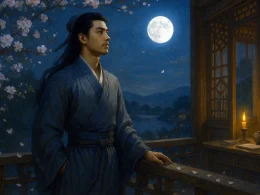Yan was wise in his day;
Rong knew to go his way.
But Yan did not live long,
Rong was poor all along.
They had posthumous fame.
What's the use of vain name?
Did they know after death
How to enjoy their breath?
Value your body high!
It's no use when you die.
Better buried unclad,
If people felt less sad.
Original Poem
「饮酒· 其十一」
陶渊明
颜生称为仁,荣公言有道。
屡空不获年,长饥至于老。
虽留身后名,一生亦枯槁。
死去何所知,称心固为好。
客养千金躯,临化消其宝。
裸葬何必恶,人当解意表。
Interpretation
Composed during the transition between Jin and Song dynasties, this eleventh poem in Tao Yuanming's "Twenty Poems on Drinking" series reflects the poet's profound meditations on life after retiring to rural seclusion. Having witnessed the turbulence of officialdom and chaotic times, Tao develops a unique perspective on fame, wellness, and mortality, embodying his philosophical outlook of "enlightened living" and "returning to authenticity."
First Couplet: "颜生称为仁,荣公言有道。"
Yán shēng chēng wéi rén, Róng gōng yán yǒu dào.
Yan Hui was called benevolent; Rong Qiqi deemed enlightened.
The poet introduces two ancient paragons of virtue, establishing a framework to examine the relationship between reputation and reality, life and death.
Second Couplet: "屡空不获年,长饥至于老。"
Lǚ kōng bù huò nián, cháng jī zhì yú lǎo.
In constant poverty they died untimely; perpetual hunger marked their aging years.
This stark portrayal of virtuous men's harsh fates challenges conventional moral assumptions, questioning whether virtue guarantees earthly rewards.
Third Couplet: "虽留身后名,一生亦枯槁。"
Suī liú shēn hòu míng, yīshēng yì kūgǎo.
Though leaving posthumous fame, their lives remained withered and worn.
The couplet reveals Tao's sober realization that even enduring fame cannot compensate for a life of suffering, demonstrating his characteristic clarity and detachment.
Fourth Couplet: "死去何所知,称心固为好。"
Sǐ qù hé suǒ zhī, chènxīn gù wéi hǎo.
The dead know nothing—contentment in life alone holds value.
With philosophical directness, Tao asserts the primacy of present fulfillment over posthumous reputation, establishing his existential priorities.
Fifth Couplet: "客养千金躯,临化消其宝。"
Kè yǎng qiānjīn qū, lín huà xiāo qí bǎo.
Men cherish their bodies as priceless treasures, yet death reduces all to nothing.
The poet critiques excessive bodily preservation, recognizing life's transient nature and the futility of material attachments.
Sixth Couplet: "裸葬何必恶,人当解意表。"
Luǒ zàng hé bì è, rén dāng jiě yì biǎo.
Why scorn naked burial? One should transcend superficial concerns.
In this radical conclusion, Tao advocates complete liberation from worldly conventions, proposing "returning to nature" as the ultimate philosophical resolution.
Holistic Appreciation
Through reflecting on the fates of ancient figures Yan Hui and Rong Qiqi, the poem reveals profound life philosophy: "virtue doesn't guarantee fortune" and "reputation can't equal contentment." With remarkable candor, the poet advocates valuing personal "contentment" above posthumous fame or longevity pursuits. The straightforward language conveys penetrating wisdom throughout, expressing both clear-eyed recognition of life's hardships and deep reverence for authentic existence. Tao Yuanming rejects conventional morality as absolute standard, instead embracing natural principles as true measure - demonstrating his enlightened, philosophical approach to human life.
Artistic Merits
The poem uniquely integrates philosophical discourse into poetic form through plain yet profound language, employing classical allusions with natural ease to reveal deep meaning in simple expressions. Tao Yuanming masterfully blends acute observations of reality and human existence into verse, achieving remarkable depth through economical expression. Its steady rhythm and effortless parallel structure harmonize reason and emotion, embodying his signature "unaffected naturalness" while reflecting spiritual transcendence beyond fame and mortality.
Insights
This work reminds us that life's value resides not in others' judgments or empty reputation, but in personal fulfillment and inner peace. What Tao Yuanming pursued was neither extreme asceticism nor blind conformity, but rather spiritual homecoming between ideals and nature. In our modern high-speed, achievement-obsessed society, this wisdom of "understanding true meaning" proves particularly precious - prompting us to reconsider: what constitutes genuinely settled living?
Poem translator
Xu Yuanchong (许渊冲)
About the poet

Tao Yuanming(陶渊明), 365 – 427 CE, was a poet, literary figure, fu writer, and essayist active during the late Eastern Jin and early Liu Song dynasties. Born in Chaisang (near present-day Jiujiang, Jiangxi Province), he pioneered a new genre of pastoral-themed literature, expressing profound philosophical insights through simple language. His poetic style became an enduring aesthetic standard in classical Chinese poetry.











